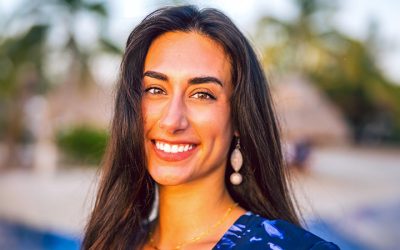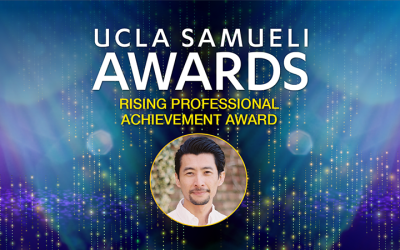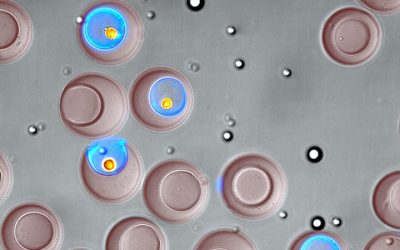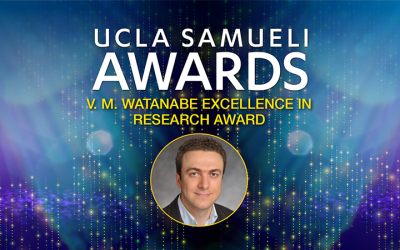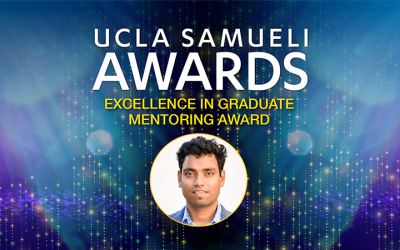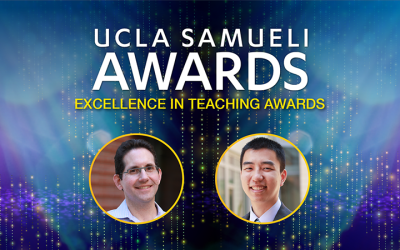
HEADLINES – UCLA Samueli In The News 2012
November
New York Post
New DNA database helps NYers Find Out Where They’re Really From
Call it a genetic GPS. Researchers at UCLA have created software that locates where in the world people ultimately came from — just by looking at their DNA. The technology, called spatial ancestry analysis, pinpoints a person’s heritage through genetics, sometimes within 60 miles of their geographic origin. The Post collected saliva samples from six New Yorkers and sent them to 23andMe, a company that analyzes DNA and reveals genealogical traits. Then UCLA computer science associate professor Eleazar Eskin ran the data through his gene machine. The results surprised many of the volunteers.
October
Popular Science
Brilliant 10: Aydogan Ozcan Turns Smartphones into Medical Devices
Need a blood test? The phone in your pocket has enough power to do it. Aydogan Ozcan, an electrical engineer, grew up in Turkey, where he saw that advanced medicine sometimes didn’t reach the country’s rural areas. In many parts of the world, ailments are never even diagnosed. Ozcan’s medical devices could fix that.
September
EE Times
U.S. Boosts Funding for Nanotech Deployment
The National Science Foundation awarded $55.5 million to three university consortia, including one headquartered at the UCLA Henry Samueli School of Engineering and Applied Science, to work with U.S. industry to advance nanotechnology science and engineering and transfer innovations to manufacturers.
National Science Foundation
President Obama Honors Early Career Scientists and Engineers (Video)
President Barack Obama met this week with recipients of the United States government’s highest honor for scientists and engineers in the early stages of their independent research careers–the Presidential Early Career Award for Scientists and Engineers (PECASE). Several honorees were interviewed, including
UCLA computer science assistant professor Jennifer Wortman Vaughan, on the inclusion of women in computer science careers.
August
Time
Windows that Generate Electricity from Invisible Light? Is This the Future or What?
Slapping solar panels on your humble abode may not seem like the height of fashionable home design, but what if you could just use your windows to gin up a little juice? UCLA researchers claim they’ve developed a transparent solar cell that will do just that, absorbing solar radiation through something like a glass-fitted opening without compromising your ability to see through it. The news on Professor Yang Yang’s transparent solar cells was also carried on KPCC; KCET; Slate; New Scientist; and in the Daily Bruin.
July
ACM A.M. Turing Award
Turing 100 Celebration Webcast (Video)
The Turing 100 celebration features computer science professor Judea Pearl, alumnus Vint Cerf, and computer science adjunct professor Alan C. Kay, all Turing Award winners, during a two-day celebration of the pioneering British mathematician, for whom the highest award in computer science is named after.
Also, the printed program is available in PDF format here.
Time
UCLA Researchers Build World’s Fastest Camera to Screen for Cancer
Researchers at UCLA have developed a camera capable of recording 36.7 million frames per second. Of course, the high-throughput imaging flow analyzer, as it’s called, won’t be used to take awesome slow-motion shots. Instead, it’s meant to pick out rare cancer cells in blood samples.
UCLA Researchers Build World’s Fastest Camera to Screen for Cancer
The news was also carried in CNET; Popular Science; Medgadget; and Popular Photography.
Wired
Asian Internet Traces Roots to Kilnam Chon
Wired features UCLA Engineering alumnus Kilnam Chon, who brought the Internet to Asia. Chon was recently named to the inaugural Internet Hall of Fame as a Global Connector.
June
Scientific American
Researchers Discover Hacker-Ready Computer Chips
Electrical engineering professor John Villasenor, an expert on hardware security, writes in Scientific American on the reported discovery of “hacker-ready” computer chips. He calls it “a wake-up call to the importance of hardware security.”
Villasenor, also a senior fellow at the Brookings Institution, has also recently written on technology patents, drones, and music royalties, in publications such as Forbes, Slate and The Huffington Post.
Forbes
mHealth: The Next Frontier For Mobile Service Growth
A guest post in Forbes proclaims mHealth, or mobile health, is “The Next Frontier For Mobile Service Growth,” as it is emerging as a significant growth opportunity for companies looking to capitalize on machine-to-machine (M2M) technology in wireless healthcare. The article cites the Open mHealth Consortium, co-founded by UCLA computer science professor Deborah Estrin, as a good example for having “established a flourishing ecosystem of multiple players across the mobile, software, and healthcare industries to implement a roadmap for mHealth technology development.”
CNET
Internet Co-Creator Vint Cerf Welcomes IPv6 Elbow Room
CNET has a Q&A with UCLA Engineering alumnus Vint Cerf, Google’s Chief Internet Evangelist, on Internet Protocol version 6 (IPv6), which provides “more room” for a larger Internet. Cerf also explains, in a short video, on the history and future of space allocation on the Internet.
May
PC World
Internet Hall of Fame Opens… On the Web
Thirty-plus Internet pioneers, innovators and “global connectors” — yes, even including Al Gore — have been inducted into the first class of the Internet Hall of Fame. UCLA-affiliated inductees included computer science professor Leonard Kleinrock and distinguished alumni Vint Cerf, Paul Baran and Jon Postel (both Baran and Postel were inducted posthumously).
Wired
Vint Cerf: We Knew What We Were Unleashing on the World
Cerf talked with Wired about how the military brought the TCP/IP protocol into being, how he and his co-conspirators knew — almost 40 years ago — what they were unleashing on the world, the threats to the net today, and what he’d like to see next: a vision that includes Internet packets raining down from the
sky.
The Atlantic
A Video Game Where Players Help Real Doctors Diagnose Malaria
Video game players may soon become the latest line of defense against malaria. UCLA researchers have developed a free, Internet-based pattern recognition game based on images of real life blood cells. Researchers hope the online tool will cut down the amount of time it now takes to distinguish infected red blood cells from healthy ones.
Also carried in Computer World, PC Advisor (U.K.), and AllAfrica.
April
The New York Times
A Turing Award for Helping Make Computers Smarter
Google search, I.B.M.’s Watson Jeopardy-winning computer, credit-card fraud detection and automated speech recognition. There seems not much in common on that list. But it is a representative sampling of the kinds of modern computing chores that use the ideas and technology developed by Judea Pearl, the winner of this year’s Turing Award. The award, often considered the computer science equivalent of a Nobel prize.
The news was also carried in: The Wall Street Journal; PC Mag; CNET; PC World; KPCC 89.3;US News; The Chronicle of Higher Education; and Agence France-Press.
Scientific American
Fossil Free: Microbe Helps Convert Solar Power to Liquid Fuel
A new “bioreactor” could store electricity as liquid fuel with the help of a genetically engineered microbe and copious carbon dioxide. The idea—dubbed “electrofuels” by a federal agency funding the research—could offer electricity storage that would have the energy density of fuels such as gasoline.
The news was also carried in Popular Mechanics, and in The Engineer (U.K.)
New Scientist
New Search Tool to Unlock Wikipedia
A new online tool developed by computer science professor Carlo Zaniolo, holder of the Norman E. Friedman Chair in Knowledge Sciences, and his colleagues, allows Wikipedia users to ask the online encyclopedia complicated and specific questions.
Los Angeles Times
Op-Ed: The Drone Threat — in the U.S.
Electrical engineering professor John Villasenor on drone proliferation in the United States. A new law raises an issue that has received too little attention: the threat that they could be used to carry out terrorist attacks.
Villasenor was also on a panel on U.S. drone surveillance that was carried on C-SPAN
Fast Company
How To Protect Your Company From Invention Theft
Professor Villasenor writes in Fast Company on how to protect Your company from invention theft. He has a second article in Fast Company on “Why Companies Should File for Patents Now.”
Poptech
Bioremediation (video)
In a process called bioremediation, Poptech Fellow and UCLA civil and environmental engineering assistant professor Shaily Mahendra uses bacteria and fungi to indicate levels of pollution and ecosystem health. These same microorganisms can also be used to detoxify a wide variety of environmental pollutants, restoring a contaminated environment back to its healthier state.
UCLA Today
‘Odd-couple’ Pairings Energize Research, Win Grants
UCLA Engineering faculty are working with colleagues across campus in the humanities, arts, social sciences on trans-disciplinary projects. The relatively new Trans-Disciplinary Seed Grants come from UCLA’s Office of the Vice Chancellor of Research and the Academic Senate Council on Research, which together provide up to $25,000 per project. By offering grants that are only available when faculty from different fields collaborate, ideas that couldn’t be explored before become possible.
Orange County Register
Who is Google Hiring?
The newspaper reported that UCLA is one of Google’s top spots for recruiting employees.
Popular Mechanics
Lab-Created Cells Could Target Tumors and Deliver Drugs
At UCLA, Tim Deming and his team are among the growing number of scientists taking their inspiration from some of nature’s most notorious bad guys: viruses.
UCLA Invents magazine (PDF)
The Newest issue of UCLA Invents (PDF) features innovations from UCLA Engineering faculty in technologies for healthcare, clean energy, and other significant areas.
Greentech Media
How Big a Solar System? How Big a Battery System? Questions From the Lab
Professor Rajit Gadh, Director of the Smart Grid Energy Research Center at UCLA Engineering, is leading an effort to answer questions on integrating rooftop solar, electric vehicles, batteries, into the smart grid.
Daily Bruin
UCLA Students Gear Up for “Engineers Got Talent” Show
Smooth jazz, a five-person rock band and a Bollywood dance crew are just three of the wide array of acts being showcased tonight at Engineers Got Talent, a show aimed at exhibiting the talents of engineering students.
http://goo.gl/f2Lrl
Daily Bruin
CollegeRoots, a New Music Site Launched by UCLA Students, Aims to Promote College Artists
A team of UCLA undergrads including business-economics, computer science, and music majors, have created CollegeRoots, a new music site to promote college artists.
Daily Bruin
Camaraderie Unites UCLA Dragon Boat Team on and off the Water
UCLA students have endless opportunities, read how one computer science student paddles with UCLA’s dragon boat team.
March
Technology Review
A Leap Forward for Plastic Solar Cells
A record-breaking polymer solar cell made by researchers at the University of California, Los Angeles, converts 10.6 percent of the energy in sunlight into electricity. The performance of the cell surpasses the previous record, 8.6 percent, set in July of last year by the same group.
Also carried in Science Daily; and in Mongabay.
Daily Mail (U.K.)
Smartphone Sensor Targets E. coli
The Daily Mail (U.K.) reports on the development by UCLA Engineering associate professor Aydogan Ozcan and colleagues of a cell phone-based sensor that can detect the presence of the bacterium Escherichia coli in food and water.
Also carried in Popular Science, and in LA Weekly.
National Public Radio’s Fresh Air
Drones Over America: What Can They See?
John Villasenor, a senior fellow at the Brookings Institution and a professor of electrical engineering at UCLA, explains what drones over U.S. skies will be able to see and how they work. He also talks about the privacy and national security concerns raised by using drones for surveillance purposes.
TEDxBigApple
Aydogan Ozcan – Microscopy on a Cellphone: An Emerging Telemedicine Platform (video)
UCLA Engineering associate professor Aydogan Ozcan explains how his innovative research in imaging techniques has enabled the use of our cellphones as microscopes, a powerful and disruptive idea for bringing cost effective microscopy and micro-analysis to remote and developing countries.
Poptech Science
Shaily Mahendra: Bioremediation (video)
In a process called bioremediation, Poptech Science Fellow Shaily Mahendra, an assistant professor of civil and environmental engineering, uses bacteria and fungi to indicate levels of pollution and ecosystem health. These same microorganisms can also be used to detoxify a wide variety of environmental pollutants, restoring a contaminated environment back to its healthier state.
Daily Bruin
Google Vice President and Father of the Internet Vinton Cerf Speaks on Future Online Possibilities
As a graduate student at UCLA, Vinton Cerf worked on a team that eventually created the first computer network. Later, as an associate professor at Stanford, he helped develop a code to allow for the movement of digital data.
Daily Bruin
UCLA Clubs Engineer Youth Motivation Day to Boost Student Interest in the Sciences
More than 225 middle school students fired rockets built from straws and clay, constructed towers out of paper and ate ice cream made from liquid nitrogen in Ackerman Grand Ballroom.
Daily Bruin
Robot Developed by UCLA Graduate Students is at Cutting Edge of Surgical Mentorship
Aspiring surgeons may one day receive training over the Internet as a result of new technology recently developed by two UCLA graduate student researchers. Mechanical engineering graduate researchers Stephen Prince and Christopher Lim have designed, prototyped and constructed a robot affectionately named the LapaRobot.
Slate
Can the Government Force Suspects To Decrypt Incriminating Files?
Electrical engineering Professor John Villasenor blogs at Slate on the courts deciding if the Fifth Amendment applies to encryption.
Villasenor also has two blogs at Fast Company: on patents for tech companies, and on first-to-file patents.
Toronto Star
How a Mathematical Formula can Decode Serial Killers
Serial killers follow a predictable pattern that matches their “Devil’s Staircase” trails of death with neural firing in their brains, a study reveals. The study was conducted by UCLA Engineering researchers
UCLA/Getty Conservation Program WordPress Blog
Pigment Identification of Polychrome Wood Masks from the Congo
A group of UCLA students, including engineers, presented a poster at the Southern California Society for Microscopy and Microanalysis (SCSMM) meeting regarding a project to identify pigments on a group of Kuba masks from the Conga, that are part of the collection of the Fowler Museum at UCLA.
LA Weekly
Informer Blog: UCLA Scientists Invent Cheap, Bendy Solar Panels That Could Charge Your Car, Phone
This is the handiest thing to come out of UCLA since those stretchy, glowing devices that can “move with the body.” (AKA, a raver’s dreamwear.) Now, UCLA is expanding its stretch-nology into the Big Green industry. A new method of collecting the sun’s energy and using it to power man’s devices is being perfected.
CBS Los Angeles
UCLA Students Compete To Build The World’s Most Fuel-Efficient Car
Three UCLA engineering students are competing to break the super-milege record using green technology in Shell’s Eco-marathon. Chris Underhill, Stephen Chow, and Joseph Lee visited the KCAL9 studios Tuesday to talk about their fuel-efficient vehicle. They are trying to beat the 2,565 mile per gallon record set by the 2011 winners.
Physics Today
BOOKENDS: Questions and answers with Francis F. Chen
Though formally retired from UCLA, Chen, who joined the engineering school in 1969, continues to manage an active low-temperature plasma research lab and occasionally advises graduate students. He is author of An Indispensable Truth: How Fusion Power Can Save the Planet.
February
Forbes
30 under 30
Bioengineering graduate student Albert Mach was selected as one of Forbes “30 under 30” in its science and innovation category. The list recognizes “today’s disrupters and tomorrow’s brightest stars. Mach was recognized for his centrifuge on a chip, which could detect cancer via a blood test.
Yahoo! News
Math Formula May Explain Why Serial Killers Kill
Electrical engineering professor Vwani Roychowdhury and researcher Mikhail Simkin have discovered that the seemingly erratic behavior of the “Rostov Ripper,” a prolific serial killer active in the 1980s, conformed to the same mathematical pattern obeyed by earthquakes, avalanches, stock market crashes and many other sporadic events.
The news was also carried in several other news outlets, including:
Forbes; Fox News: MSNBC: The Daily Mail (U.K.): and Discovery News.
Fast Company
Who owns your personal history?
In an era when nearly everything we do is recorded, we have less control over what we choose to remember, and perhaps more crucially, what to forget. Electrical engineering professor John Villasenor is the author.
Scientific American
Why the Supreme Court GPS Decision Won’t Stop Warrantless Digital Surveillance
Villasenor also has a blog on Scientific American regarding the future of digital location tracking following the recent U.S. Supreme Court decision, United States v. Jones.
PhysOrg
Of microchemistry and molecules: Electronic microfluidic device synthesizes biocompatible probes
A team of UCLA researchers, including mechanical and aerospace engineering professor C.J. Kim, has developed an all-electronic digital microfluidic device for microscale chemical synthesis in organic solvents, which overcomes several limitations of previous technologies.
Fast Company
WalmartLabs Brings “Two Pizza Teams,” Startup Culture To Walmart Empire
Fast Company profiles @WalmartLabs, co-founded by alumnus Venky Harinarayan MS ’90, and its innovations for the retail giant’s mobile and online sales efforts.
Wall Street Journal
Andreessen’s Firm Raises $1.5 Billion
The Wall Street Journal reports that Silicon Valley venture capital firm Andreessen Horowitz, co-founded by alum Ben Horowitz MS ’90, has raised more than $1.5 billion in two new funds.
KCET SoCal Connected
Military goes Green
The L.A. public television’s news and current affairs magazine recently aired a story on the military’s adoption of green technologies. Professor Ann Karagozian was interviewed for the piece.
Daily Bruin
Students create software projects for disabled persons in Code for a Cause competition
A team of UCLA students took first place in a competition to create software for disabled persons with a modified Sudoku game for the visually impaired.
Daily Bruin
Not so simple
The engineering honor society, held its 2nd annual Rube Goldberg competition. A team of students from IEEE wins top prize with an apparatus built around the issue of income inequality.
CNET
At RockMelt, engineers pound out features at light speed
Computer science alumnus Devon Rifkin ’10 is profiled in CNET’s Day on the Job series. Rifkin is a front-end engineer for Mountain View, Calif.-based RockMelt, which offers a new Web browser integrated and optimized for social media such as Twitter and Facebook.
Curbed Los Angeles
The 10 Most Popular Curbed LA Stories of 2011
The Curbed L.A. blog named its story on the Kleinrock Internet Heritage Site in Boelter Hall as one of its most popular stories of 2011.
Science
New Lease for Leftover Light (subscription required)
UCLA Engineering researchers reported at the fall Materials Research Society meeting that they’ve devised polarizing filters made from organic solar cells that recycle some of the absorbed light from liquid crystal displays.
Panchabuta-Renewable Energy & Cleantech (India)
India needs to partner with early innovators across the globe for SmartGrid success
Mechanical and aerospace engineering professor Rajit Gadh, director of the UCLA Smart Grid Energy Research Center, was interviewed about smart grid technology development around the world as it relates to India.
Daily Bruin
UCLA’s ‘Beatboxing Rhino’ of the night
The Daily Bruin’s series on UCLA at night profiles first-year mechanical engineering student Moonsoo Jo, who practices his beatboxing at Wilson Plaza at the base of Janss Steps. The article also includes a short video.
January
The Scientist
Top ten innovations 2011
Electrical engineering associate professor Aydogan Ozcan’s cell phone microscope took top honors in The Scientist magazine’s Top Innovations of 2011. One judge said of the new device, “this is an exciting new technology that showcases ingenuity away from preconceived ideas.”
The honor was also highlighted in the Examiner.com
Associated Press
Some lanes of scorched LA-area freeway now open
Civil and environmental engineering associate professor Scott J. Brandenberg was quoted in an article on the December crash of a tanker truck along the 60 freeway, and its subsequent days-long shutdown.
Los Angeles Times
Blocked 60 Freeway doubles and triples drivers’ commute times
Thomas Sabol, an adjunct professor of civil and environmental engineering was quoted in the story on how an intense fire can damage a freeway overpass.
The Engineer (U.K.)
UCLA and KIER create network platform for the smart grid
Britain’s Engineer reported on a new partnership between the UCLA Henry Samueli School of Engineering and Applied Science and the Korea Institute of Energy Research to advance smart-grid research and development. Rajit Gadh, director of UCLA’s Smart Grid Energy Research Center and a professor of mechanical and aerospace engineering, was quoted.
Fast Company
The future of the Internet’s here. And it’s creepy
Two new studies are offering a sneak peak into the future of the Internet: 24/7 digital surveillance of citizens is about to become affordable for repressive regimes worldwide. John Villasenor, an electrical engineering professor and a senior fellow at the Brookings Institution, is quoted in the article
GreenTechMedia
UCLA bringing a fully networked smart grid to campus
A new partnership between the UCLA Henry Samueli School of Engineering and Applied Science and the Korea Institute of Energy Research to advance smart-grid research and development. Professor Gadh was quoted.
Jewish Journal
Judea Pearl, father of slain WSJ reporter, is a leader in artificial intelligence
Computer science professor Judea Pearl is profiled on the occasion of being named winner of the Harvey Prize in Science and Technology from the Technion-Israel Institute of Technology.
News
Bruin Engineer Makes Waves Researching Microplastics in LA River
Jamie Leonard ’20, M.S. ’21 started working to mitigate plastic pollution in high school, taking part in an initiative to replace her school’s plastic water bottles with metal ones. Now a UCLA Ph.D. student, she has her eye on microplastics
UCLA Samueli Announces 2024 Rising Professional Achievement Award
Every year, the UCLA Samueli School of Engineering selects and recognizes outstanding achievements by a number of its alumni, faculty members and students who have excelled in various fields.
Advance in Immune Cell Screening Uncovers Receptors that Target Prostate Cancer
A recent UCLA study demonstrates a new process for screening T cells, part of the body’s natural defenses, for characteristics vital to the success of cell-based treatments.
UCLA Samueli Announces 2024 Excellence in Research Award
Every year, the UCLA Samueli School of Engineering selects and recognizes outstanding achievements by a number of its alumni, faculty members and students who have excelled in various fields.
UCLA Samueli Announces 2024 Excellence in Graduate Mentoring Award
Every year, the UCLA Samueli School of Engineering selects and recognizes outstanding achievements by a number of its alumni, faculty members and students who have excelled in various fields.
UCLA Samueli Announces 2024 Excellence in Teaching Awards
Every year, the UCLA Samueli School of Engineering selects and recognizes outstanding achievements by a number of its alumni, faculty members and students who have excelled in various fields.

